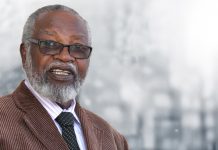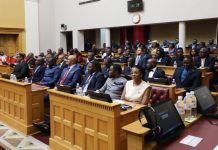By MakanDay and a team of Zambian journalists.
8 November 2024
In MakanDay’s first nationwide collaboration, journalists from five provinces—Copperbelt, Eastern, Northern, Southern, and North-Western—investigate systemic failures and injustices within Zambia’s criminal justice system, which disproportionately denies the poor access to justice.
In Kasama, Northern Province, families of murder victims struggle with unresolved loss as cases remain uninvestigated. Similar hardships are faced by relatives of murder victims in Chipata (Eastern Province), Choma (Southern Province), Kalulushi and Kitwe (Copperbelt Province), and Solwezi (North-Western Province).
ZAMBIA’S UNRESOLVED MURDER CASES
Jones Patrick Timm sits grief-stricken on a log near his family’s graveyard in the Fisheries area of Masupe ward in Chipata Central Constituency.
With tears streaming down his face, he points to the spot where his 21-year-old grandson, Arthur Timm, was found alive but in pain on December 15, 2023, a scene that still haunts Jones.
Arthur had been brutally attacked and left near the roadside. Around 5:00 a.m., a passerby discovered him in severe pain and notified his grandfather. Arthur then was taken to Chipata General Hospital but died shortly after arrival.
According to Jones, Arthur was found with severe injuries, including missing t***s, and a stick was forcibly inserted through his rectum.
Jones claims that the police failed him and his family by refusing to properly investigate his grandson’s “brutal murder”. Despite the disturbing nature of the injuries, the police concluded Arthur’s death was the result of a hit-and-run accident.
Shockingly, they didn’t even visit the crime scene, citing a lack of fuel.
Instead, Jones claims, police told the family to conduct their own investigation and relay any findings back to them.
Jones, now 56 years old, expressed deep frustration with the empty promises and excuses from the police, who repeatedly assured him that the case would be investigated.
“To this day, we have no report. When I go to the police station, they tell me the officer in charge is not available—still no report,” Jones explained. “If he had been hit by a car, we would have noticed some damage to the vehicle. Even the traffic officers, no one came to inspect the accident scene.”
Exhausted by the lack of action, Jones has given up on seeking justice for his grandson, resigning himself to the painful reality that his pleas for an investigation have gone unheard.
“The police must respond effectively to crime when called upon. We pay taxes that fund their salaries. If they fail to protect us, why should we continue paying them?” He questioned. “It might be better to stop.”
The Eastern Province Police Commissioner, Robertson Mweemba, stated that his officers are doing everything possible to investigate the cases and bring the culprits to justice. He said between January and August 2024, 38 murder cases were reported, resulting in the arrest of 19 suspects who are currently facing trial in court.
The case of Arthur Timm in Chipata is just one of many instances where the police have allegedly neglected their duties, reflecting a broader issue across Zambia. Interviews with relatives of murder victims in Chipata, Choma, Kasama, Kalulushi, Kitwe, and other towns reveal a range of challenging experiences in their efforts to seek justice from the police.
MakanDay’s investigation tracked 11 alleged murder cases. Our investigation found that, out of 11 cases, only one suspect—arrested in connection with the murder of driver Simon Lungu in Kalulushi—remains in prison awaiting trial. The remaining cases were either not investigated, or suspects were released without further action.
POLICE DEFEND RECORD AMIDST CRITICISM
In a statement to MakanDay, police spokesperson Rae Hamoonga defended the police’s record, emphasising that efforts to enhance professionalism, training, and community engagement have led to more effective policing.
“Over the years, the Zambia Police Service has made significant strides in improving service delivery, investigation processes, and crime prevention strategies,” said Hamoonga. “However, we recognise that there is still room for improvement, and we remain committed to building on these gains to ensure a safer and more secure environment for all citizens.
KASAMA TRAGEDIES: FAMILIES LEFT LIMBO AS POLICE FAIL TO INVESTIGATE MURDERS
In Kasama, the families of three murder victims were left frustrated and heartbroken as they continue to seek justice in the face of alleged police inaction.
In one case, a 12-year-old boy went missing under suspicious circumstances. The last people seen with him were identified and reported to the police, police arrested them but they were released without investigation, according to relatives of the boy.
Under Zambian law, murder suspects can be held in police detention until cleared by the court, making the release of these individuals even more perplexing. The family stopped approaching the police after officers showed no interest in pursuing leads.
In a recent case in Kasama on May 8, 2024, Patrick Chikwanda, a young orphan living with his aunt, was found dead in a drainage ditch with a twisted neck. The police were notified, and an initial arrest was made. However, the suspect was later released. According to the victim’s family, the police cited insufficient evidence and suggested that the suspect was “too old” to have committed the crime.
The third case, is a tragedy involving 32-year-old Stafford Chama, a security officer at Indo Zambia Bank who was shot outside the bank on September 8, 2023, while bank employees were still on duty. Despite the suspect being identified the next day and cartridges being collected for forensic examination, the police have not shared any findings with the family.
Chama’s death leaves behind a widow and three children, and the family alleges that Chama’s killing is not an isolated incident—another officer, named Lungu, was also killed under similar circumstances.
The families of these victims continue to appeal for thorough investigations and justice, urging the police to act on the evidence available and prevent further tragedies in the community.
A police report obtained by MakanDay, signed by Senior Criminal Investigation Officer Inspector K. Simwala, indicates that Kasama Police Station was indeed aware of Chama’s murder, as it was reported by Andrew Bwembya, a supervisor for Armguard Security.
Officers inspected the crime scene, where they found Chama’s body behind Arkay’s building near Indo Zambia Bank. On September 12, 2023, Dr. Ngwenya conducted a postmortem examination, determining the cause of death to be haemorrhagic shock resulting from gunshot wounds.
Northern Province Police Commissioner Lucky Monkondya told MakanDay that she is aware of all three cases. Regarding the murder of a security guard, she noted that Kasama police have been awaiting forensic results from Lusaka since September 2023. In the case of the missing child, police are waiting for seven years to pass before officially declaring the child deceased.
Two families – the Chama family and the missing child’s family – appealed to the Human Rights Commission in Kasama for assistance to ensure the police fulfill their duty. However, the commission informed the families that they are also waiting for the police to complete their investigation before they can take action.
Rights activist Laura Miti, who also serves as a commissioner at the Human Rights Commission, urged the police oversight institutions to intensify their efforts and focus on what is happening in less privileged areas.
CHOMA INCIDENT
In another case in Choma, 77-year-old Sipiliano Hang’andu, a resident of Mwapona Compound in Choma, died a day after being attacked while on duty as a security officer at Maquarters compound in September 2024. His granddaughter, Jacqueline Miyoba, reported that her grandfather succumbed to his injuries the day after the assault.
The family reported the incident to the police and was advised to take him to Choma General Hospital for medical examination. However, the officers on duty did not inspect the crime scene. Medical reports indicated that Hang’andu had suffered a broken collarbone with an open wound, head injuries, and broken teeth.
The family submitted the medical report to the police, who instructed them to open a docket. On September 29, 2024, Hang’andu died around 13:00 hours, with the police only collecting his body around 17:00 hours.
Despite Hang’andu identifying his attacker before his death, the police have taken no action to arrest the suspect. Family members continue to seek justice but have not received assistance from the authorities.
HOW MUCH DO YOU HAVE VULTURE IN THE POLICE
The practice of closing cases without investigation is widespread. MakanDay has found it has become even more frequent in recent years. In other instances, police asked victims to provide money for fuel or transport to carry out their work.
Like other relatives of murder victims, Charity Mwansa—the mother of a 12-year-old boy who went missing under suspicious circumstances in Kasama—feels discriminated against due to her poverty and inability to cover transport costs.
“The police never came to the village because we didn’t have money to pay for their transport,” she recalled. “We had to bring the suspects to the police station ourselves. They were held for 11 days but then released, with the police claiming they were innocent.”
Teckson Bruza Simute, a former police officer with 32 years of service, believes that public trust in the police has eroded due to misconduct within the service.
“We used to be held in high esteem, and the public knew we were there to protect them. However, things are different now; that’s why some officers are labeled as ‘junkies,’” he said. “The government needs to address this issue and tackle the challenges facing the police.”
A senior officer, speaking anonymously, pointed to the police reserve unit as a source of misconduct, noting that the public often cannot distinguish them from regular officers.
“Some cases are handled by the police reserve,” said the officer. “There’s a need to address this, possibly by introducing different uniforms so citizens can easily identify these overzealous officers.”
The reserve is made up of Zambian residents aged 18 and above who volunteer for service and are deemed suitable by the Inspector-General for enrolment as Reserve police officers.
NO RESPONSE FROM THE POLICE OVERSIGHT AGENCY
The Police Public Complaints Commission, the agency responsible for examining allegations of police conduct, did not respond to MakanDay’s request for comment.
The police oversight agency had promised to address MakanDay’s detailed questions, including the actions being taken to ensure that police conduct themselves professionally and serve the public diligently. However, it has yet to do so.
THE PARLIAMENTARY COMMITTEE’S OBSERVATION
In the 2023 report of the parliamentary committee on national security and foreign affairs, it was emphasised that for the police to function more effectively, the government must tackle key issues, including the inadequacy of the six-month training programme for officers, dilapidated police stations and housing units, staffing shortages, and the lack of modern equipment and resources.
The committee praised the government’s ongoing support for the Zambia police service but noted that police stations frequently fail to receive regular monthly funding for their administrative and operational needs.
“Inadequate funding is seen as a major factor contributing to the public perception of the Zambia Police Service as ineffective and corrupt,” the report concluded.
MINISTRY OF HOME AFFAIRS STATEMENT
In the 2024 Zambia Police Service budget policy statement, Home Affairs and Internal Security Minister Jack Mwiimbu informed the National Assembly that the current number of police officers is insufficient. Zambia has nearly 22,000 officers serving a population of 20 million, resulting in a policing ratio of one officer per 894 citizens—double the UN-recommended ratio of one officer per 450 citizens.
The minister also highlighted several other challenges the police service faces, including a shortage of staff and office accommodations, as well as a deficit in its vehicle fleet. Currently, the Zambia Police has 520 motor vehicles, compared to the ideal requirement of 1,857, leaving a shortfall of 1,337 vehicles. “This shortage has contributed to the administrative and operational challenges faced by the institution,” he stated.
To address the transport challenge, he noted that the government has procured motor vehicles for all constituencies using the Constituency Development Fund.
Mwiimbu further disclosed a housing deficit of 14,053 units for the 22,000 officers, which forces many officers to seek accommodation outside police camps. This lack of housing complicates efforts to mobilise officers quickly during emergencies.
FORMER OFFICERS ‘TESTIMONIES’
Joel Sashi, who served in the police force for 30 years from 1980 to 2010, told MakanDay that many murder cases could be solved if the old crime funding system were revived.
“We used to have a crime fund that helped the police pay informants. Over time, however, this fund has gradually diminished within the police service,” Sashi explained.
According to Sashi, the crime fund was distributed from headquarters to provincial centres and respective districts, with allocations specifically for the Criminal Investigation Department (CID).
“When a detective went on an investigation trip, he was entitled to a crime fund that could be used for lodging and to compensate informers. During that time, murder cases were more frequently resolved compared to now. Nowadays, we have numerous cases that remain unresolved,” he explained.
“Other allowances, including plain clothe and risk allowances, were also removed from our payslips,” added a current CID officer who requested anonymity to avoid risking his job. “Previously, the crime fund was provided on Fridays to support our work over the weekend when administrative staff were off duty. Now, it’s no longer available.”
However, the minister attributed the increase in the personal emolument budget from nearly K1.9 billion (K1,890,186,107) in 2023 to over K2.2 billion (K2,280,415,256) in 2024 to the recruitment of 2,000 new officers and the reinstatement of plainclothes allowances for detectives.
POLICE RESOLVE TO TACKLE MISCONDUCT AMID OPERATIONAL CHALLENGES
The police emphasised that, despite operational challenges and resource constraints, they remain committed to addressing any shortcomings and ensuring that all cases are investigated with the seriousness and diligence they deserve.
Hamoonga outlined measures being taken to enhance professional conduct within the force, including continuous training, strengthening internal oversight mechanisms, and promoting accountability and integrity to combat police misconduct and bribery allegations.
“The Zambia Police Service upholds a zero-tolerance policy toward corruption and misconduct. We have established internal reporting channels, disciplinary procedures, and the Complaints Against Police Unit to investigate and address cases of bribery or unethical behaviour. Officers found guilty of misconduct face appropriate disciplinary actions, which may include suspension, dismissal, or legal prosecution, depending on the severity of the offense,” he explained.
JONES AND OTHERS DEMAND ANSWERS FROM THE POLICE
Despite the challenges facing the police, many Zambians, like Jones in Chipata, are seeking answers about unresolved crimes, including the murder of his grandson, Arthur Timm.
“Our appeal is for the police to find out what killed him (Arthur). Those responsible for his death should be brought to justice. That’s our plea,” he said.
Reporters | Angela Mtambo (Radio Mano – Kasama Northern Province) Clara Chisenga (Radio Icengelo – Kitwe, Copperblet Province), Womba Kasela (Culture Radio – Kitwe), Mable Gershom Phiri (Breeze FM – Chipata, Eastern Province), and McStan Ng’andu (Byta FM – Choma, Southern Province).






